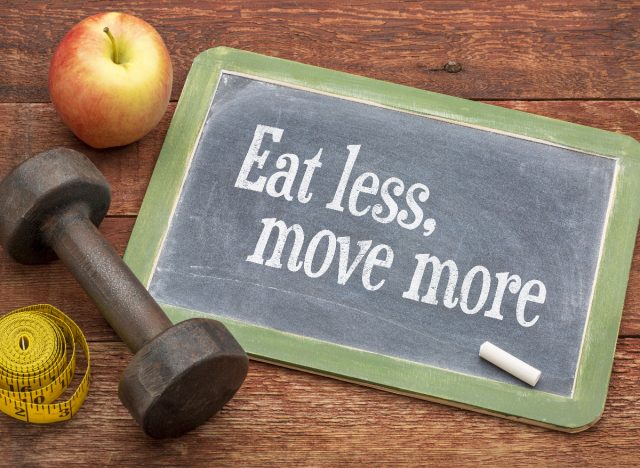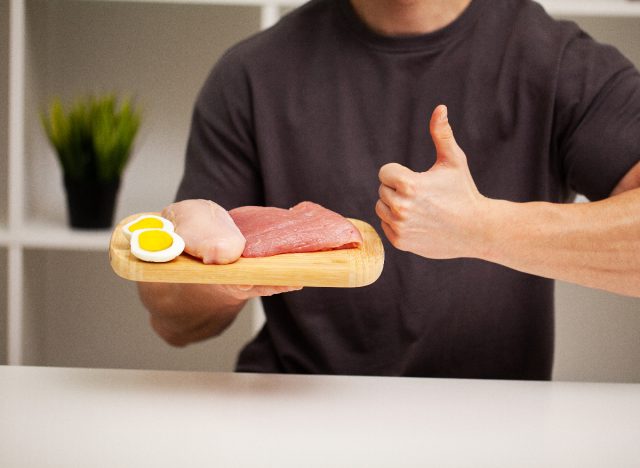Can You Build Muscle in a Calorie Deficit?

In the world of fitness and nutrition, there's been a lot of talk about whether you can build muscle in a calorie deficit, aka eating fewer calories than your body burns. Traditionally, people thought you needed to eat more calories to build muscle. However, implementing things like resistance training and protein into your routine makes it possible to pack on muscle while losing weight.
This article explores the importance of diet and exercise and ways to maximize muscle growth even when you're cutting calories.
How does a calorie deficit work?

A calorie deficit occurs when you consume fewer calories than your body expends, leading to weight loss. When you consistently stick to a calorie deficit, your body depends on stored energy sources, such as fat, to make up for the shortfall, resulting in weight loss over time.
To achieve a calorie deficit, you can either reduce your calorie intake through diet or increase your calorie expenditure through physical activity—or ideally, a combination of both. It's important to create a moderate calorie deficit to avoid negative side effects like muscle loss or nutrient deficiencies. Tracking your calorie intake and expenditure can help you stay on track and reach your weight-loss goals safely.
Can you gain muscle in a calorie deficit?

Gaining muscle while in a calorie deficit presents a challenge, as it requires careful attention to nutrition and training. In such a state, the body may lack the energy and nutrients necessary for optimal muscle growth. However, several key factors can influence whether muscle gain is achievable in a calorie deficit.
Adequate protein intake is crucial, with recommendations ranging from 1.6 to 2.2 grams per kilogram of body weight per day. Regular resistance training is also essential, as it stimulates muscle growth through progressive overload, gradually increasing workout intensity. Additionally, prioritizing nutrient-dense foods is vital to ensure adequate vitamin and mineral intake for muscle function and recovery.
While muscle gain in a calorie deficit is possible, progress is typically slower than in a calorie surplus. Various factors, including training experience, genetics, and the extent of the deficit, can influence the rate of muscle gain in such conditions.
Steps to build muscle in a calorie deficit:

Building muscle in a calorie deficit requires careful planning and adherence to certain strategies to optimize muscle growth while promoting fat loss. Here are steps to help you achieve muscle growth while in a calorie deficit:
1. Prioritize protein. Ensure you're consuming enough protein to support muscle growth and repair. Aim for around 1.6 to 2.2 grams of protein per kilogram of body weight daily.
2. Strength train. Engage in regular resistance training workouts, lifting weights, or using resistance bands to challenge your muscles. Aim for at least three to four sessions per week.
3. Engage in progressive overload. Continuously challenge your muscles by gradually increasing your workouts' weight, reps, or intensity over time. This progressive overload principle is essential for stimulating muscle growth.
4. Focus on compound movements. Include compound exercises such as squats, deadlifts, bench presses, rows, and overhead presses in your workouts. These exercises recruit multiple muscle groups and are more effective for building muscle mass.
5. Time your nutrients. Consume a balanced meal containing protein and carbohydrates around your workouts to support muscle repair and recovery.
6. Get sufficient rest. Ensure you're getting enough quality sleep each night to promote muscle recovery and growth.
7. Monitor progress. Track your progress regularly by monitoring changes in strength, muscle size, and body composition. Adjust your approach as needed to continue making progress toward your goals.
8. Stay consistent. Consistency is key to building muscle in a calorie deficit. Stick to your nutrition and training plan consistently over time to see results.
In conclusion, building muscle in a calorie deficit is indeed possible, although it may require a more nuanced approach compared to when in a calorie surplus. By prioritizing protein intake, engaging in regular strength training, focusing on progressive overload, and ensuring adequate rest and recovery, you can effectively stimulate muscle growth while promoting fat loss.
While the process may be slower than when in a surplus, with patience and dedication, you can achieve your muscle-building goals even in a calorie deficit.









